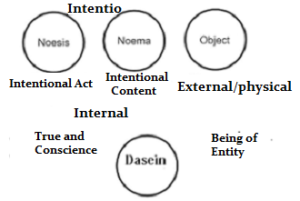
Arquivo para April 30th, 2025
Early linguistics after the Renaissance
In previous posts, we’ve emphasized the Grammatica Speculativa (from the Latin Speculum, mirror) through the modes of meaning, of intelliging and of being, present first in Duns Scotus and then in Husserl, in his phenomenological intentional analysis that will be dealt with in Heidegger’s habilitation thesis, but there is an early linguistics in Leibniz and his disciple Christian Wolff.
Latin Speculum, mirror) through the modes of meaning, of intelliging and of being, present first in Duns Scotus and then in Husserl, in his phenomenological intentional analysis that will be dealt with in Heidegger’s habilitation thesis, but there is an early linguistics in Leibniz and his disciple Christian Wolff.
Leibniz’s project was what he called Characteristica Universalis, a formal and universal language capable of expressing mathematical, scientific and metaphysical concepts, which Wolff described as an ontology.
Leibniz started from the idea of “supreme genera of things”, with broader and more fundamental categories used to describe being and existence, the most general classes of all things exist, and are thus the basis for organizing and understanding the world.
These works can be found in the analyses of Étienne Gilson (Being and Some Philosophers, 1949), who called these philosophers “essentialist” rationalists and has a connection with both the dispute over universals and the current linguistic turn.
Leibniz’s project was not finalized and Christian Wolff’s became a general classification, where he classified general knowledge as classes of History, Philosophy (of things and human actions) and Mathematics (the quantity of things), each with subdivisions.
The project of Duns Scotus remains and is rediscovered by Heidegger, the ens rationis (entity of reason) as a thought entity is next to the ens naturae (entity of nature) so the real, physical or psychic, sensible or suprasensible, corporeal or incorporeal is an extra animam, outside the soul (here we can say “transcendent” of consciousness), but Husserl criticizes the psychic.
Husserl differentiates psychologism, in his Logical Investigations, showing the difference between the logical and the psychic real, “what is true, is absolutely true, is ‘in itself’ true: the truth is identical and only one, whether men or not, whether angels or gods apprehend it in judgment (HUSSERL, 2014, p. 88).
The “in itself” must have the power of truth that can be interpreted correctly, truth is, for phenomenology, a unity that is always the same, even if the acts of judgment are many and varied, and carried out by various subjects, diverse numerically or even specifically, it belongs to another mode of being than that of consciousness.
Scotus, Husserl and Heidegger are within this “truth” of consciousness and it is unequivocal.
Heidegger, M. (1978) Frühe Schriften -Gesammtausgabe (Primeiros Escritos – Edição Completa) Vol. I. Frankfurt am Main: Vittorio Klostermann.
Husserl, E. (2014) Investigações lógicas: Prolegômenos à Lógica Pura. Brazil, Rio de Janeiro: Forense.
Scotus, J. D. B. (1902) Johannes Duns Scoti Doct. Subtilis Grammaticae Speculativae (Cura et editio P. Fr. Mariani Fernandez Garcia). Ad Claras Acquas (Quaracchi) – Prope Florentiam: Ex Typographia Colleggi S. Bonaventurae.

